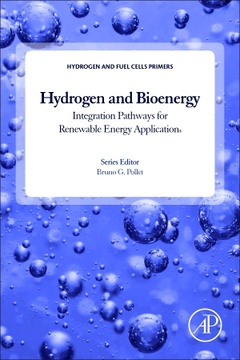Description
Hydrogen, Biomass and Bioenergy
Integration Pathways for Renewable Energy Applications
Hydrogen and Fuel Cells Primers Series
Coordinators: Pollet Bruno G., Lamb Jacob Joseph
Language: English
Subject for Hydrogen, Biomass and Bioenergy:
Keywords
anaerobic digestion; biochemical hydrogen production; bioenergy; biofuel; biogas; biogas enrichment; biohydrogen; biomass; biophotolysis; compressed hydrogen; dark fermentation; electrical energy; electricity generation; electrochemical hydrogen production; energy comparison; energy infrastructure; energy storage; fermentation; gasification; hazard identification; heating; hybrid hydrogen production; hydrogen; hydrogen energy; hydrogen reforming; hydrogen upgrading; hydroprocessing; hydrothermal liquefaction; hydrotreatment; industry; liquid hydrogen; microbial electrolysis; pyrolysis; reforming; safety; thermochemical hydrogen production; thermochemistry; transportation; water electrolysis
186 p. · 15x22.8 cm · Paperback
Description
/li>Contents
/li>Readership
/li>Biography
/li>Comment
/li>
Hydrogen and Bioenergy: Integration Pathways for Renewable Energy Applications focuses on the nexus between hydrogen and carbon compounds as energy carriers, with a particular focus on renewable energy solutions. This book explores opportunities for integrating hydrogen in the bioenergy value chain, such as adding hydrogen to upgrade biofuels and lower CO2 emissions during production. The book also takes the inverse path to examine hydrogen production by chemical and biological routes from various bioresources, including solid waste, wastewater, agricultural products and algae. This broad coverage of technologies and applications presents a unique resource for researchers and practitioners developing integrated hydrogen and bioenergy technologies.
This book will also be useful for graduate students and new researchers, presenting an introductory resource in the areas of hydrogen and bioenergy. Energy planners and engineers will also benefit from this content when designing and deploying hydrogen infrastructure for power, heating and transportation.
1. Introduction2. Traditional Routes for Hydrogen Production and Carbon Conversion3. Emerging Routes for Hydrogen and Carbon Integration4. Sources and Storage5. The Nexus: Beneficially Crossing Technologies6. Hydrogen and Biomass to Liquid7. Hydrogen and Biogas8. Transition to an Infrastructure for Renewable Energy9. Conclusions
Corporations, Researchers, Engineers, Health professionals, Physicians, Consultants
Jacob Joseph Lamb, PhD, is an Associate Professor at NTNU – The Norwegian University of Science and Technology, Trondheim, Norway. He specializes in digitalization of energy storage and conversion systems. He is the leader of the Renewable Energy Bachelor of Engineering program at NTNU, and teaches in renewable energy systems, energy storage and process engineering. He has published a number of articles and book chapters in various energy production, conversion, and storage fields.
- Provides a comprehensive picture of hydrogen generation from biomass, as well as other sources of hydrogen for power, heating, transportation and storage applications
- Explores the ways hydrogen can be utilized in combination with bio-derived hydrocarbon chains to produce a variety of substitutes for fossil fuel-based petrochemicals
- Fills the gap between theoretical knowledge and technology viability
- Analyzes how these technologies fit into an overall energy strategy targeted at expanding the renewable energy sector




